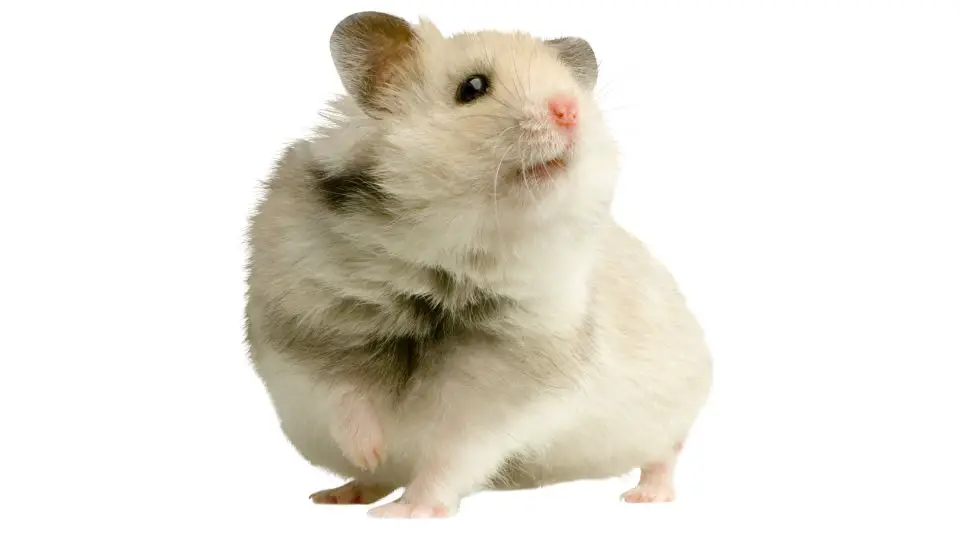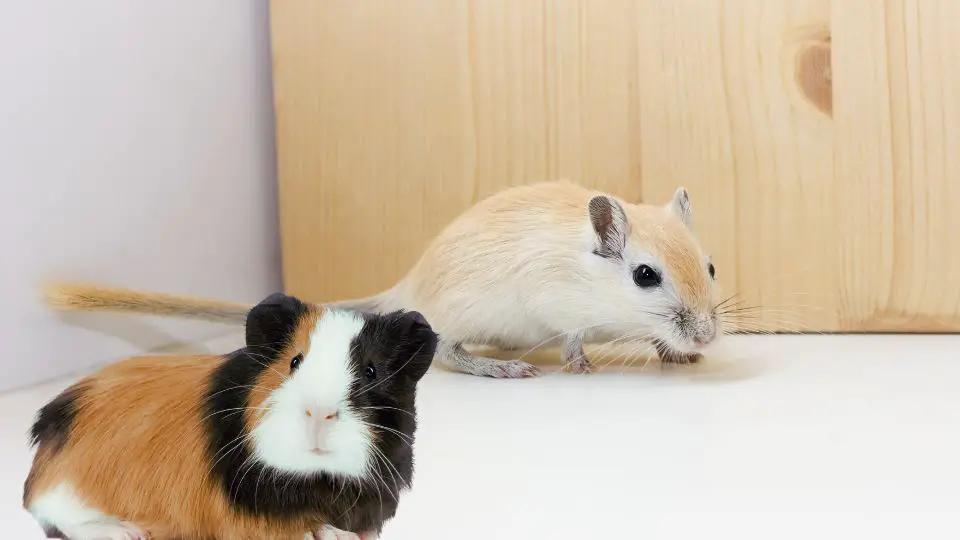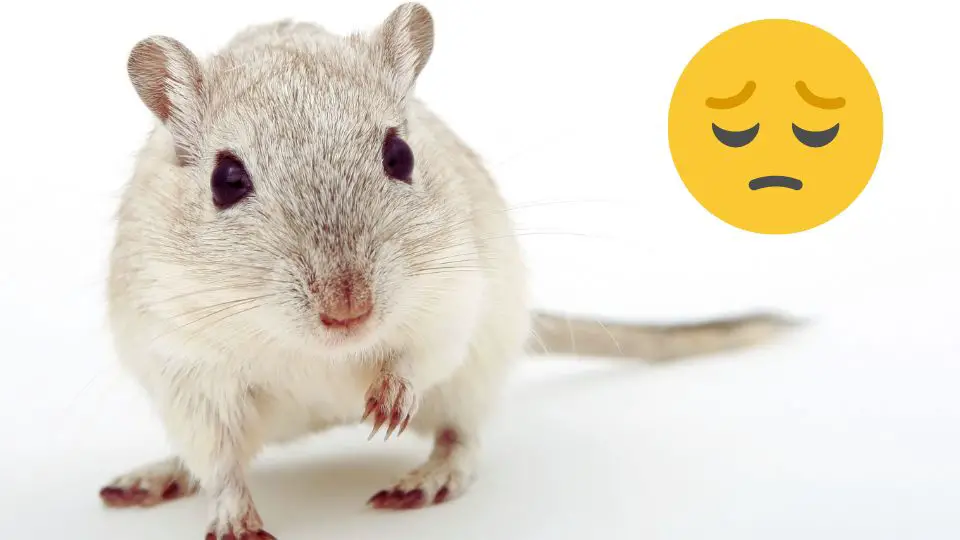Head tilt is a concerning condition that can affect gerbils, causing their head to tilt to one side. This abnormal positioning can be a sign of an underlying health issue that requires attention.
Head tilt in gerbils can be caused by various factors such as inner ear infections, trauma or injury to the head, vestibular disorders, and tumors or growths in the head region.
In this article, we will explore the various factors that can contribute to head tilt in gerbils, including infections, injuries, vestibular disorders, and tumors.
Inner Ear Infections
Inner ear infections in gerbils can be caused by various factors, including bacterial or viral infections. These microorganisms can enter the ear canal, leading to inflammation and infection. Poor hygiene, unsanitary living conditions, or a weakened immune system can increase the risk of developing an inner ear infection.
Gerbils with inner ear infections may exhibit several noticeable symptoms. One of the most prominent signs is a head tilt, where the gerbil’s head is tilted to one side or constantly tilted to one direction. Other symptoms include loss of balance, circling or spinning in circles, difficulty walking or moving, and disorientation. Gerbils may also experience a loss of appetite, lethargy, or display changes in behavior.
Complications of Inner Ear Infections
If left untreated, inner ear infections can lead to severe complications for gerbils. The infection may spread to other parts of the ear, causing damage to the delicate structures of the inner ear, such as the cochlea and vestibular system. This can result in permanent hearing loss, balance problems, and neurological issues. In some cases, gerbils may develop secondary infections or abscesses in the affected ear, further worsening their condition.
Trauma or Injury
Head trauma or injury can occur in gerbils due to various reasons. Some common causes include falls from heights, collisions with objects or surfaces, rough handling, or attacks by other animals. Gerbils are small and delicate creatures, making them susceptible to injuries that can result in head tilt.
If a gerbil shows signs of head trauma or injury, seek immediate veterinary attention. The veterinarian will assess the extent of the injury through a physical examination and may recommend additional tests such as X-rays to evaluate the condition of the head and neck. Treatment will depend on the severity of the injury and may involve pain management, antibiotics to prevent infections, and supportive care.
Types of Trauma that Affect Gerbils
There are different types of trauma that can affect gerbils and potentially cause head tilt:
- Falls: Gerbils are natural climbers and may accidentally fall from elevated surfaces, such as shelves or cages with improper protection. Falls can lead to head injuries and result in head tilt.
- Collisions: Gerbils may collide with objects within their habitat or even run into the sides of their cage when startled or frightened. These collisions can cause head trauma and result in head tilt.
- Rough Handling: Mishandling or grabbing a gerbil too forcefully can cause injury, particularly if the head or neck is impacted. This can lead to head trauma and subsequent head tilt.
- Attacks by Other Animals: If gerbils are housed with other animals that exhibit aggressive behavior or if they are subjected to attacks by predators, they may experience head injuries or trauma.
Gerbils with head trauma or injury may exhibit various signs and symptoms, including head tilt, disorientation, loss of balance, difficulty walking or moving, and changes in behavior. In some cases, there may also be visible injuries such as wounds or bleeding around the head or face.
Vestibular Disorders
The vestibular system is responsible for maintaining balance and spatial orientation in animals, including gerbils. Vestibular disorders refer to conditions that affect this system, leading to symptoms such as head tilt, loss of balance, and coordination issues. These disorders can result from various underlying causes, including infections, tumors, or age-related degeneration.
Several vestibular disorders can affect gerbils and contribute to head tilt. Some of the common ones include:
- Inner Ear Infections: Infections of the inner ear, such as bacterial or fungal infections, can disrupt the functioning of the vestibular system. These infections may result from injuries, foreign objects entering the ear, or the spread of infections from other parts of the body. Inner ear infections can lead to head tilt, loss of balance, and other vestibular-related symptoms.
- Ear Mites: Ear mites are microscopic parasites that infest the ears of gerbils and cause irritation and inflammation. The presence of ear mites can affect the vestibular system, leading to head tilt, unsteady movements, and scratching or shaking of the head.
- Tumors: Tumors or abnormal growths in the head or neck region can disrupt the vestibular system and cause head tilt. These tumors can be benign or malignant and may require surgical intervention or other treatment options.
- Age-Related Degeneration: As gerbils age, their vestibular system may undergo degenerative changes, leading to vestibular disorders. This can result in head tilt, loss of balance, and other related symptoms. Age-related degeneration is a common cause of head tilt in older gerbils.
Gerbils with vestibular disorders may exhibit symptoms such as head tilt, circling or spinning behavior, loss of balance, and difficulty moving or walking. Treatment options will depend on the specific vestibular disorder and its underlying cause.
Tumors or Growths
Tumors or abnormal growths in the head region can disrupt the normal functioning of the gerbil’s vestibular system, leading to head tilt. The vestibular system, located in the inner ear, plays a crucial role in maintaining balance and spatial orientation. When tumors develop in this area, they can affect the vestibular system, causing the gerbil to tilt its head to one side.
There are different types of tumors that can develop in the head region of gerbils, including both benign and malignant tumors. Some of the common types of tumors seen in gerbils include:
- Lumps and Masses: Gerbils can develop benign or malignant lumps and masses in the head region, including the ears, cheeks, or jaw. These growths can put pressure on the vestibular system, resulting in head tilt.
- Ear Tumors: Tumors that develop in the ears, such as polyps or tumors of the ear canal, can impact the vestibular system. These tumors may cause inflammation, blockages, or damage to the inner ear structures, leading to head tilt.
- Brain Tumors: In some cases, gerbils may develop brain tumors that can affect the vestibular system and cause head tilt. These tumors may arise within the brain or spread from other parts of the body.
It is crucial to seek veterinary assistance if your gerbil exhibits head tilt or other concerning symptoms. A veterinarian will perform a thorough examination, which may include imaging tests such as X-rays or ultrasound, to diagnose the presence of tumors or growths. Proper diagnosis is essential to determine the nature of the tumor and develop an appropriate treatment plan.
How do you treat a gerbil head tilt?
Head tilt in gerbils can be a distressing condition that requires prompt veterinary attention. The treatment approach for gerbil head tilt may vary depending on the underlying cause. It is crucial to seek professional veterinary advice to accurately diagnose the cause of head tilt and determine the appropriate treatment options.
Diagnosis and Assessment
When a gerbil presents with head tilt, a veterinarian will conduct a thorough examination to identify the underlying cause. Diagnostic tests such as physical examination, imaging (X-rays, ultrasound), and laboratory tests may be performed to assess the gerbil’s condition. This helps to determine whether the head tilt is due to an infection, injury, tumor, or other factors.
Treating Infectious Causes
If an infection, such as an inner ear infection, is identified as the cause of head tilt, the veterinarian may prescribe antibiotics or antifungal medication to address the infection. You have to follow the prescribed dosage and duration of treatment to ensure effective elimination of the infection.
Managing Vestibular Disorders
Vestibular disorders affecting the gerbil’s inner ear can contribute to head tilt. While these conditions can sometimes resolve on their own, supportive care may be provided to help the gerbil cope with the symptoms. This can include providing a comfortable and stable environment, minimizing stress, and offering easily accessible food and water.
Addressing Tumors or Growths
In cases where head tilt is caused by tumors or abnormal growths, treatment options may involve surgical removal of the tumor, radiation therapy, or chemotherapy. The course of treatment will depend on the type, location, and severity of the tumor. A veterinarian with expertise in small animal care will guide you through the available treatment options and recommend the most appropriate approach.
Supportive Care
Supportive care plays an important role in the overall treatment of gerbils with head tilt. This includes ensuring the gerbil has access to a balanced diet with appropriate nutrients, clean water, and a comfortable and stress-free environment. Regular monitoring of the gerbil’s condition, as well as providing any prescribed medications or supplements, is essential.
Monitoring and Follow-Up
After initiating treatment, you should monitor the gerbil’s progress closely. Regular follow-up visits to the veterinarian will help assess the effectiveness of the chosen treatment method and make any necessary adjustments. Monitoring the gerbil’s overall health, behavior, and response to treatment will guide the veterinarian in providing the best possible care.
Conclusion
In conclusion, head tilt in gerbils can have multiple causes, each requiring specific attention and treatment. Infections, injuries, vestibular disorders, and tumors are among the common factors that can result in head tilt. Identifying the underlying cause through veterinary diagnosis is essential for formulating an appropriate treatment plan.
Whether it involves administering medications, providing supportive care, or considering surgical intervention, the goal is to address the root cause and alleviate the gerbil’s symptoms. If you notice your gerbil experiencing head tilt, it is vital to consult a veterinarian who can provide a thorough examination and guide you in providing the best care for your furry friend.







